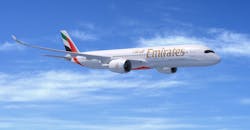50 New Jets for Emirates in $16B Airbus Order
Emirates Airline placed a purchase agreement estimated at $16 billion with Airbus for 50 A350-900 aircraft, revising an earlier, $21.4-billion order for 40 A330-900 aircraft and 30 A350-900 aircraft. "This follows a thorough review of various aircraft options and of our own fleet plans," the Emirates chairman and CEO stated.
The firm order also will include the attendant Rolls-Royce Trent XWB engines powering the twin-engine A350-900s.
The A330s are no longer part of the contract, but the revision to the order also is indicative of the changing strategies for airlines and jet-builders about the future role for wide-body aircraft. Dubai-based Emirates for now has determined to operate with larger, wide-body jets rather than the single-aisle, narrower A330s.
“Complementing our A380s and 777s, the A350s will give us added operational flexibility in terms of capacity, range, and deployment,” Emirates chairman and chief executive Sheikh Ahmed bin Saeed Al Maktoum stated. "In effect, we are strengthening our business model to provide efficient and comfortable air-transport services to, and through, our Dubai hub.”
The A350-900 is the first model of the redesigned Airbus A350 series, known as A350 XWB. These are wide-body, twin-aisle aircraft incorporating fuel-saving design features like a carbon-fiber fuselage and wing structures. Airbus claims the redesign results in 25% lower operating costs, and 25% lower fuel-burn and CO2 emissions (comparing it with the Boeing 777 and 787 Dreamliner that it competes against.)
The A350-900 typically seats 325 passengers in a three-cabin configuration, and it has a range of 8,100 nmi (15,000 km / 9,321 miles.)
When Emirates placed the earlier order last February it prompted Airbus to announce it would cease production of the A380 four-engine, wide-body jet, the largest commercial aircraft in the world. It was introduced in 2007. Emirates continues to be the largest operator of the A380, but like four-engine, Boeing 747 series the A380 been hampered by changes in airlines’ operating and cost objectives.
The last A380 is in production now and will be delivered in 2021. “The decision is in implementation now," according to Airbus CEO Guillaume Faury. "We love the A380 at Airbus. "It is a great plane and will continue to fly for decades; we are committed to supporting it. But no, the decision that was taken to cease production is not reversed.”
